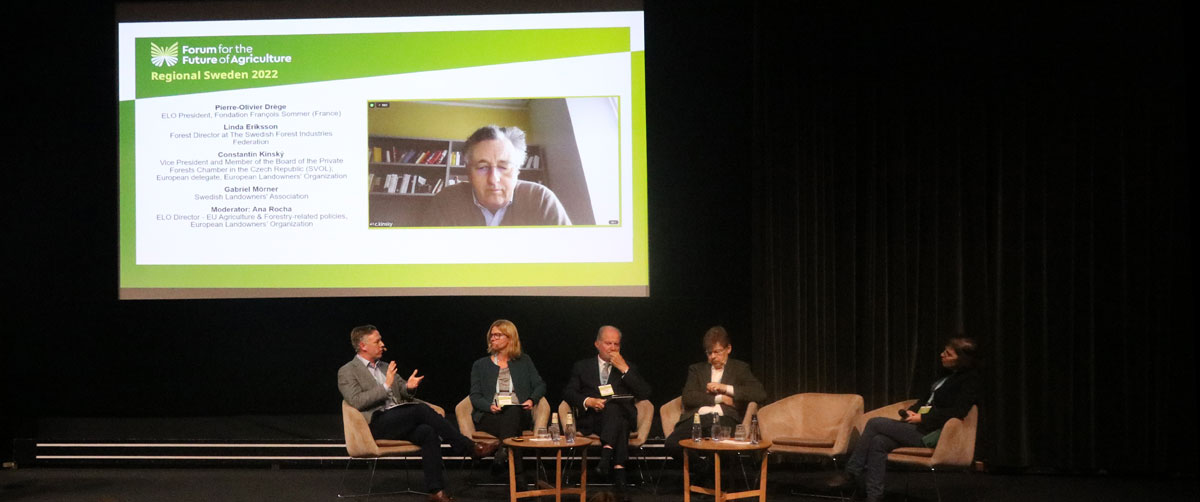2022 Regional Sweden – Session 3 summary – What is the type of forest we need following climate change scenarios?
2022 Regional meeting Sweden
Thursday, Dec 01, 2022
The final session of the ForumForAg Regional Conference held on December 1, 2022 in Sweden focused on forestry. It took place the day after the European Commission had presented a proposed EU certification framework for carbon removals.
Keynote speaker Prof. Tomas Lundmark, Professor (chair) of Silviculture, Forest Ecology and Management, Swedish University of Agricultural Sciences, Umeå, Member of the Royal Swedish Academy of Forestry and Agriculture, began by saying forests bring climate benefits in two different ways. One removes carbon from the atmosphere. The other provides services and products. The first compensates for emissions from sources like oil and cement. The second supplies wood to replace those products.
Instead of the debate focusing on which benefit is better, Prof. Lundmark suggested couching forests as a socio-ecological system capable of both increasing decarbonisation and the availability of forest-based products. Landowners should be encouraged to make their cropping system even more sophisticated. Carbon sinks should be treated as commercial goods of value to society with a market price. Recycling and reuse of forest-based products should be increased. Technical solutions are required to store carbon in ways other than forests.
He suggested a business model where the value of carbon sinks belongs to landowners and market-based solutions are adapted to regional and national conditions. This could yield €200-400 million a year to landowners. He identified four conditions for such a voluntary carbon market: the commodity should be valued irrespective of whether the landlord intended to create it or not; carbon removal must be real and in absolute terms; standards and calculation methods are needed for both nature-based and technical sinks; payment should be based on the volume of carbon stored at the end, compared to the beginning, of the year.
As the EU considers certifying carbon removals, Prof. Lundmark urged landowners to be involved in the debate. “If you want to influence this in some way, it’s time now.”
Threats to forests
Pierre-Olivier Drège, ELO President, Fondation François Sommer (France) was the first of the respondents. He identified climate change as one of the main threats since forests suffer from the new conditions it brings. He rejected criticism of overcropping forests, pointing instead to the dangers of fire and disease if trees are not properly managed and are eventually felled by nature. There is, however, a new kind of threat: “lack of action by forest owners” influenced by voices urging them not to chop down trees. That is a real risk because beech trees, for instance, cannot survive climate change. “There is a need for action to try and imagine another forest with other species.” He was critical of the concept of “restoration” since that implied going back to the past which climate change prevents. His message to scientists and society was that the landscape is going to change. “You need to imagine the future. And the future will be a different forest.”
Mr Drège called for a change in terminology. “Carbon pump”, he suggested, was a more appropriate term than “carbon sink” to describe the role of forests in taking carbon from the atmosphere, storing it and then giving it to society in the form of pulp, energy or wood products.
Linda Eriksson, Forest Director at the Swedish Forest Industries Federation, called for policy makers “to see the whole picture”. She criticised the European Commission for focussing on forests as sinks “and not so much on the part that could help with substitution using wood and bioenergy”.
Constantin Kinsky, Vice President and Member of the Board of the Private Forests Chamber in the Czech Republic (SVOL), identified “human behaviour” as the main threat to forests. Criticising the view that “not doing anything is the right thing”, he called for “a mindset change” among regulators, politicians and policymakers “to move from prescription to motivation”.
He too urged them to prepare for forests’ potential future, not look to the past; consider ways to motivate managers to do the right thing for their forests and society; and to focus on best practice sharing in areas like water filtration and soil retention rather than on theoretical, perfect solutions.
Later in the general discussion, he played down the inevitability of trade-offs between different goals. Water and soil retention, biomass and biodiversity promotion could all be achieved, he said, by close to nature forest management.
Gabriel Mörner, Swedish Landowners’ Association, stressed the wide diversity of Europe’s forests and shared criticism of politicians trying to impose policy from above. They could perhaps set broad strategies and provide support services such as education, but should trust foresters to tend their own properties. Accountability and management should “be part of the landowners’ responsibility”.
As business models of payments for ecosystems services are being developed, the panellists expressed their views. The payments should not lead to totally protected or unmanaged forests where all activity is banned. Many landowners are protecting biodiversity voluntarily and could take the lead in inviting investors to join them. Schemes should be bottom up, allowing foresters to opt in, rather than imposed from above.
Click here to view videos from the Sweden event.
Click here to view the agenda and speakers bios from the Sweden event.



